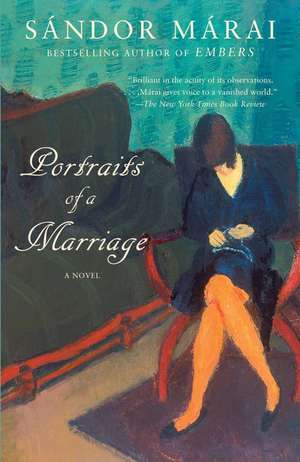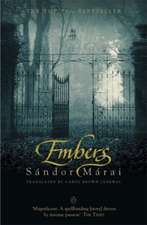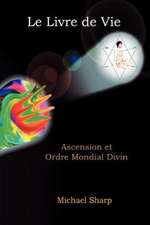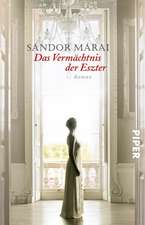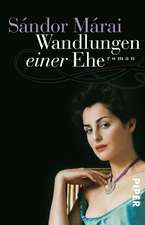Portraits of a Marriage: Vintage International
Autor Sandor Maraien Limba Engleză Paperback – 29 feb 2012
Peter and Ilonka are a wealthy couple whose outwardly perfect marriage is undone by secrets. The insecure Ilonka believes she can never be elegant and refined enough for her husband, while Peter has long been tormented by his forbidden love for Judit, a peasant and servant in his childhood home. What Judit longs for most, however, is freedom from the constraints of the society that has ensnared all three in a vortex of love and loss. Set against the backdrop of Hungary between the wars, in a world on the verge of dramatic change, this exquisite novel offers further posthumous evidence of Marai’s brilliance.
Translated from the Hungarian by George Szirtes
Din seria Vintage International
-
 Preț: 99.38 lei
Preț: 99.38 lei -
 Preț: 126.36 lei
Preț: 126.36 lei -
 Preț: 74.80 lei
Preț: 74.80 lei -
 Preț: 71.87 lei
Preț: 71.87 lei -
 Preț: 67.18 lei
Preț: 67.18 lei -
 Preț: 95.10 lei
Preț: 95.10 lei -
 Preț: 96.31 lei
Preț: 96.31 lei -
 Preț: 131.55 lei
Preț: 131.55 lei -
 Preț: 68.16 lei
Preț: 68.16 lei -
 Preț: 79.37 lei
Preț: 79.37 lei -
 Preț: 74.37 lei
Preț: 74.37 lei -
 Preț: 81.67 lei
Preț: 81.67 lei -
 Preț: 90.54 lei
Preț: 90.54 lei -
 Preț: 88.86 lei
Preț: 88.86 lei -
 Preț: 109.54 lei
Preț: 109.54 lei -
 Preț: 99.08 lei
Preț: 99.08 lei -
 Preț: 78.38 lei
Preț: 78.38 lei -
 Preț: 107.68 lei
Preț: 107.68 lei -
 Preț: 119.36 lei
Preț: 119.36 lei -
 Preț: 80.58 lei
Preț: 80.58 lei -
 Preț: 120.26 lei
Preț: 120.26 lei -
 Preț: 69.81 lei
Preț: 69.81 lei -
 Preț: 99.82 lei
Preț: 99.82 lei -
 Preț: 117.33 lei
Preț: 117.33 lei -
 Preț: 69.91 lei
Preț: 69.91 lei -
 Preț: 97.88 lei
Preț: 97.88 lei -
 Preț: 94.07 lei
Preț: 94.07 lei -
 Preț: 98.37 lei
Preț: 98.37 lei -
 Preț: 71.62 lei
Preț: 71.62 lei -
 Preț: 71.25 lei
Preț: 71.25 lei -
 Preț: 105.00 lei
Preț: 105.00 lei -
 Preț: 91.10 lei
Preț: 91.10 lei -
 Preț: 77.34 lei
Preț: 77.34 lei -
 Preț: 82.61 lei
Preț: 82.61 lei -
 Preț: 102.92 lei
Preț: 102.92 lei -
 Preț: 133.39 lei
Preț: 133.39 lei -
 Preț: 95.70 lei
Preț: 95.70 lei -
 Preț: 97.57 lei
Preț: 97.57 lei -
 Preț: 71.72 lei
Preț: 71.72 lei -
 Preț: 101.58 lei
Preț: 101.58 lei -
 Preț: 74.59 lei
Preț: 74.59 lei -
 Preț: 99.30 lei
Preț: 99.30 lei -
 Preț: 89.91 lei
Preț: 89.91 lei -
 Preț: 105.63 lei
Preț: 105.63 lei -
 Preț: 115.50 lei
Preț: 115.50 lei -
 Preț: 74.69 lei
Preț: 74.69 lei -
 Preț: 84.60 lei
Preț: 84.60 lei -
 Preț: 90.13 lei
Preț: 90.13 lei -
 Preț: 68.82 lei
Preț: 68.82 lei -
 Preț: 99.60 lei
Preț: 99.60 lei
Preț: 120.74 lei
Nou
23.10€ • 24.19$ • 19.12£
Carte disponibilă
Livrare economică 15-29 martie
Livrare express 01-07 martie pentru 75.38 lei
Specificații
ISBN-10: 1400096677
Pagini: 371
Dimensiuni: 132 x 202 x 21 mm
Greutate: 0.43 kg
Editura: VINTAGE BOOKS
Colecția Vintage Books
Seria Vintage International
Notă biografică
Sándor Márai was born in Kassa, in the Austro-Hungarian Empire, in 1900, and died in San Diego, California, in 1989. He rose to fame as one of the leading literary novelists in Hungary in the 1930s. Profoundly antifascist, he survived the war, but persecution by the Communists drove him from the country in 1948, first to Italy, then to the United States. He is the author of the internationally best-selling Embers, Casanova in Bolzano, Esther’s Inheritance, The Rebels, and Portraits of a Marriage.
Extras
What’s that, dear? . . . Nothing. Wait, I have to blow my nose.
Has he gone? Tell me when he has gone.
He’s paying now? . . . Can you see what his wallet looks like? Describe it carefully; I don’t want to look that way. Is it brown crocodile skin? Yes? Oh, I’m so pleased.
Why am I pleased? Just because. Well, yes, of course, I gave him the wallet, for his birthday. Ten years ago. Was I in love with him? . . . That’s a hard question, dear. Yes, I believe I did love him. Has he gone yet?
Good, I’m glad he’s gone. Wait, I must powder my nose. Does it show that I have been crying? . . . It’s stupid, I know, but see how stupid people can be? My heart still beats faster when I see him. Can I tell you who he is? I can tell you, darling, It’s no secret. That man was my husband.
Come on, let’s get some pistachio ice cream. I really can’t understand why people say you can’t eat ice cream in winter. I love this patisserie best in winter for the ice cream. There are times I almost believe that anything possible to be done should be done, not just because it’s good or makes sense, simply because it’s possible. For some years now in any case, ever since I’ve been alone, I’ve enjoyed coming here between five and seven in the winter. I like the crimson décor, the Victorian furnishings, the old waitresses, the big metropolitan square beyond the shopwindow, watching the customers arrive. There’s a sort of warmth about it all, just a touch of fin-de-siècle. And there’s no better tea anywhere, have you noticed? . . . I know the new generation of women don’t go to patisseries. The prefer espressos, places where you have to rush, where there are no comfortable chairs, where it costs forty fillér for one black coffee, where they can eat salad for lunch, that’s how it is now. But it’s not my world. What I want is refined patisseries like this, with such furniture, with crimson carpets, with their ancient countesses and princesses, their mirrored cupboards. As you may imagine, I’m not here every day, but I do call in during the winter and feel comfortable here. My husband and I used to meet here pretty regularly, about six o’clock, at teatime, after he finished at the office.
Oh yes, he was on his way home from the office just now. It’s twenty after seven, his home time. I am familiar with every part of his routine, even now, as if it were his life I was living. At five minutes before six he rings for the office boy who brushes him down and presents him with his hat and coat, and he leaves the office, sending the car ahead so he can walk behind it and get some air. He doesn’t do much walking, that’s why he is so pale. Or there may be some other reason, I don’t know now. I don’t know the reason because I never see him, don’t talk to him, haven’t talked to him for three years. I don’t like those prissy little separations where the two parties walk arm-in-arm from the court, dine together at that famous restaurant in the park, are tender and solicitous toward each other as if nothing had happened and then, after divorce and dinner, go their own ways. I’m not that sort of woman: my morality, my blood pressure won’t allow it. I don’t believe that men and women can be good friends after divorce. Marriage is marriage; divorce, divorce. That’s what I think.
But what do you think? True, you’ve never been married.
I don’t think that relationships people have entered on and nurtured for decades, vows they have unthinkingly kept, are empty formalities, you see. I believe in the sanctity of marriage. I think divorce is a kind of sacrilege. That’s how I was brought up. But I believe it anyway, not just because of my upbringing, but because my religion demands that I believe it. I believe it because I am a woman and a divorce is no mere formality for me any more than the ritual in the church before the registrar is a formality: either it binds people together, body and soul, for once and for all, or it divides them, absolutely, and sends them their utterly separate ways. Not for one minute did I console myself with the thought that my husband and I would remain “friends” after our divorce. He was courteous, of course, and remained concerned for me, and generous too, as custom dictates that he should be. Not me, though. I was neither polite nor generous. I even took the piano, yes, as was my right. I was furious for revenge, and would happily have taken the whole house, right down to the curtains—everything. The moment we divorced I became his enemy and I remain so, as I will till the day I die. I don’t want a friendly invitation to dinner at the restaurant in the park from him; I don’t want to play the little woman, to be delicate, to be someone who visits her ex-husband’s home and looks after things when the servant steals his linen. I wouldn’t care if they stole the lot, everything, nor would I rush over to him if I heard he was ill. Why? Because we are divorced, you understand? It’s not something to which one can become resigned.
Wait, I withdraw what I just said about him being ill. I wouldn’t want him to fall ill. If he did I would visit him in the sanatorium. What are you laughing at? Are you laughing at me? Do you think I’m hoping he’ll fall ill so I can visit him? Well, of course I hope that. As long as I have hope, I will carry on hoping. But I wouldn’t want him to be too ill. He was so very pale, did you notice? . . . He has been pale like that for some years now.
I’ll tell you everything. Have you got the time? Sadly, I have all too much.
Look, here’s the ice cream. After school, I found a job in an office. We were still writing to each other then, weren’t we? You went straight off to America but we carried on writing for a while, for three or four years, I think. I remember, there was an unhealthy, foolish puppy love between us. I rather disapprove of that now. It seems we can’t live without love. But then it was you I loved. In any case, your family was rich while we lived in three rooms and a kitchen opening onto a corridor—very much a middle-class kind of apartment opening onto a corridor. I looked up to you and that kind of admiration, I now realize, is already a sign of emotional attachment with young people. I too had a nanny but mine had to get her hot water secondhand, after I’d finished my bath. Such details are very important. There are frighteningly many shades of gentility between poverty and wealth. And from poverty down, how many shades of poverty do you think there are? You are wealthy, so you can’t know the enormous difference between four hundred and six hundred a month. It’s a bigger difference than between two thousand and ten thousand a month. I know a great deal about this now. Back home, our income was eight hundred. My husband earned six and a half thousand per month. One had to get used to this.
Everything was just a little different in their home compared with ours. We lived in a rented apartment; they in a rented villa. We had a balcony with geraniums; they had a little garden with two flower beds and an old walnut tree. We had an ordinary icebox that we filled with ice in summer, while my mother-in-law had a small electric refrigerator that could produce nice neat ice cubes too. We had a general handyman working for us; they had a married couple, a servant and a cook. We had three rooms; they had four, five in fact if you include the hall. But their hall was a proper hall with light chiffon covers on the doors, whereas ours was only an entrance hall with the icebox in it—a dark, urban Pest kind of entrance hall, together with a brush rack and old-fashioned coat stand. We had a three-valve radio set assembled by Papa from individually bought components, which received whatever station it felt like receiving; they had a radiogram, which was both a radio—on which you could even pick up Japan—and a gramophone, which worked by electricity and changed records automatically. I was brought up to earn my living; he was brought up, first and foremost, to live a refined, polite kind of life, one according to important social rules. Conformity was vital. There was an enormous social difference between us but I didn’t know it then.
There was a conversation we had over breakfast once. “Those mauve covers in the dining room are a little tiring,” he said. “They are quite crude and loud, like people who are always shouting at each other. Take a look round town, my dear, and find some different covers in time for fall.”
Twelve chairs needed recovering in some less “tiring” color.
I looked at him in confusion. I thought he was joking. But it was no joke—he carried on reading the papers with a perfectly serious expression. I could see that he had clearly thought through what he had just said, that the mauve color—a little common, I must admit—really did irritate him. My mother had chosen it. It was brand-new. I cried when he left. I’m not completely stupid; I understood perfectly what he meant . . . What he wanted to say was something that could never be said directly, in plain, simple words: that there was a gulf in culture between us, that his world was not mine; that though I knew everything and had learned all there was to learn, that though I was middle-class, just as he was, my circumstances were—in tiny but vital details—different from those he had loved and had gotten used to. The middle classes are far more sensitive to such subtle distinctions than the aristocracy are. Those in the middle are forever having to secure and display their status. The upper class have no such need: their positions are assured from birth. Those in the middle are always aspiring to some position or protecting it. My husband was no longer of the aspiring generation: he had in fact surpassed even those who had something to protect. He talked about this once. He was reading a German book, saying how he had discovered the answer to the great questions of life in it, including questions of the self. I don’t like such “great questions”—my view is that life consists of a million little questions and that it is always only the totality of those that really matters. So I asked, a little mockingly:
“Do you really think you have finally come to know yourself?”
“Of course,” he answered. And he looked at me from under his glasses with such childlike seriousness and goodwill that I regretted asking the question. “I am an artist,” he continued. “It is the only thing I have any gift for. It’s not uncommon in my class. That’s how families eventually come a cropper.”
He never talked about it again.
I didn’t understand it then. He never wrote, never painted, never played any musical instrument. He despised “art lovers.” But he did read a lot, “systematically”—his favorite word—a little too systematically for my taste. I read passionately, according to mood. He read as though he were carrying out one of life’s important duties. Once he had begun a book he wouldn’t leave it until it was finished—not even when it annoyed or bored him. Reading was a religious obligation for him: he valued letters as highly as priests do relics. But he was like that with pictures too, and with museums, theaters, and concerts. Everything interested him, literally everything. But the only thing I was “interested in” was him.
It was just that he did not practice any art. He ran the factory, traveled a lot, employed artists, and made a point of paying them particularly well. But he was very careful that he should not impose his tastes, which were far different from those of the majority of his employees and advisers, on his colleagues. He never raised his voice. He spoke gently and courteously, as if he had constantly to be apologizing for something; as if he were at a loss in some matter and required help. At the same time he knew when to stick to his principles in important matters—and in business.
Do you know what my husband was? He was that rarest of all beings in creation. He was a man. He was manly.
I don’t mean in the romantic, theatrical sense of the word. Not the way a champion boxer might be said to be manly. It was his spirit that was manly: inquiring, logical, restless, adventurous, and suspicious. That was another thing about him I didn’t know at the time. Discovering such things is one of life’s hardest lessons.
It’s not what we learned at school, is it, you and I?
Perhaps I should begin at the point when he introduced me to one of his friends, the writer, Lázár. Do you know him? . . . Have you read his books? . . . I’ve read everything he has written now. I have burrowed my way through his books, thinking there must be some secret hidden in them, as if they might solve the enigma of my own life. But no. There are no answers to enigmas like that. It is life itself that provides the answers, sometimes quite surprising ones. I hadn’t read a single line of his before. Yes, I knew him by name, but had no idea my husband knew him personally—that they were friends. I came home one evening in the third year of my marriage and found him with my husband. This was the beginning of my other education. It was the first time I realized I knew nothing about my husband. I’d been living with a man yet knew nothing about him. Sometimes now I think, or rather I know, indeed am all too aware of the fact, that I had no idea what he really liked, the kind of things he preferred, and was utterly ignorant of his desires. Do you know what the two of them were doing that evening, Lázár and my husband? . . .
Recenzii
“Superbly readable. . . . Deeply satisfying. . . . Like Tolstoy, he has a kind of genius for the small touches that define a marriage, and also like Tolstoy, he is brilliant at dissecting the tiny differences that separate one layer of society from another.” —The Daily Beast
"With this phenomenal novel, our conviction is confirmed: he ranks as one of the twentieth century’s greatest novelists." —Booklist
"A cubist portrait of a harsh love and a dying society, elegantly paced and delightfully contradictory. . . . With each new voice [Márai] builds suspense and reveals new layers and twists to this tale. Suffused with nostalgia and regret, the book evokes and examines both the nature of longing and the decline of a great empire." —Publishers Weekly (starred review)
Descriere
A rediscovered masterwork from famed Hungarian novelist Sándor Márai, Portraits of a Marriage tracks the lifelong entanglement of a man and two women haunted by class differences and misdirected longings.
Peter and Ilonka are a wealthy couple whose outwardly perfect marriage is undone by secrets. The insecure Ilonka believes she can never be elegant and refined enough for her husband, while Peter has long been tormented by his forbidden love for Judit, a peasant and servant in his childhood home. What Judit longs for most, however, is freedom from the constraints of the society that has ensnared all three in a vortex of love and loss. Set against the backdrop of Hungary between the wars, in a world on the verge of dramatic change, this exquisite novel offers further posthumous evidence of Marai’s brilliance.
Translated from the Hungarian by George Szirtes
